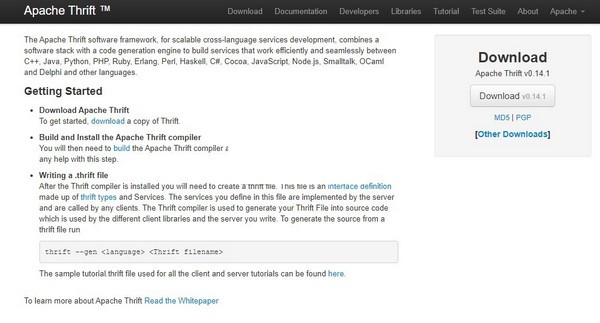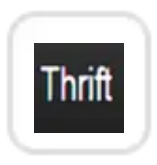【版权声明】根据《中华人民共和国著作权法》及相关法律法规,本平台提供的软件资源仅限用于个人学习、研究等非商业用途。任何单位或个人若需将本软件用于商业运营、二次开发、公共服务等营利性场景,必须事先取得软件著作权人的合法授权或许可。未经授权擅自进行商业使用,将可能面临民事赔偿、行政处罚等法律责任。 本平台已尽到合理提示义务,若用户违反上述规定产生的法律纠纷及后果,均由使用者自行承担,与平台无任何关联。我们倡导用户通过官方渠道获取正版软件,共同维护健康的知识产权生态。 注:本声明已依据《计算机软件保护条例》第二十四条、《信息网络传播权保护条例》第六条等法规制定,确保符合我国版权法律体系要求。
Apache Thrift Installation and Usage Guide
Apache Thrift is a robust service development framework that allows users to develop service Projects in various programming languages. It supports the integration with different editors, enabling users to write code and design client and server programs that are compatible with multiple programming languages.

Key Features of Apache Thrift
- Interface Description Language (IDL) - specifies everything in the IDL file from which various language bindings can be generated.
- Language Bindings - supports many languages and environments including C++, C#, Cocoa, D, Delphi, Erlang, Haskell, Java, OCaml, Perl, PHP, Python, Ruby, and Smalltalk.
- Namespaces - each Thrift file is in its own namespace, allowing the use of the same identifiers across multiple Thrift files.
- Basic Types - Thrift includes a few basic types such as bool, byte, i16, i32, i64, double, and string.
- Constants and Enums - constants can be assigned logical names.
- Structs - groups related data and can have fields of any type.
- Sparse Structs - optional basic fields that are not set and null reference fields won't be sent over the wire.
- Struct Evolution - handles the addition and removal of fields using integer identifiers without breaking existing clients.
- Containers - supports sets, lists, and maps of any type, including basic types, structs, and other containers.
- Type Aliases - any type can be given a more descriptive name.
- Services - a group of functions.
- Asynchronous Calls - non-result functions can be called asynchronously, without blocking the client until the server has processed the request.
- Exceptions - functions can raise standard or user-defined exceptions if an error occurs.
- Recursive Structures - since version 0.9.2, Thrift supports structures that contain themselves or other structures to be declared later.
Unsupported Features
Apache Thrift does not support struct inheritance (use struct composition instead), polymorphism, overloading (all methods in a service must be uniquely named), heterogeneous containers (all items in a container must be of the same type), and void returns (use wrapper structures or marker values instead).
Software Characteristics
Apache Thrift is a software project that encompasses multiple programming languages and use cases. Its goal is to make cross-language, reliable, high-performance communication and data serialization as efficient and seamless as possible. Thrift was open-sourced in April 2007 and entered the Apache Incubator in May 2008, becoming an Apache TLP in October 2010.
Advantages of Apache Thrift
1. Economical Types: The Thrift type system is designed to allow programmers to use as many native types as possible regardless of the programming language used. The economical IDL provides a description for generating code for each target language.
2. Basic Types: The choice of basic types focuses on simplification and clarity, emphasizing key types available in all programming languages.
3. Structs: Thrift structs define a common object similar to classes in OOP languages, without inheritance. A struct has a set of strongly-typed fields, each with a unique identifier.
4. ContAIners: Thrift containers are strongly-typed and map to common container types in most programming languages.




